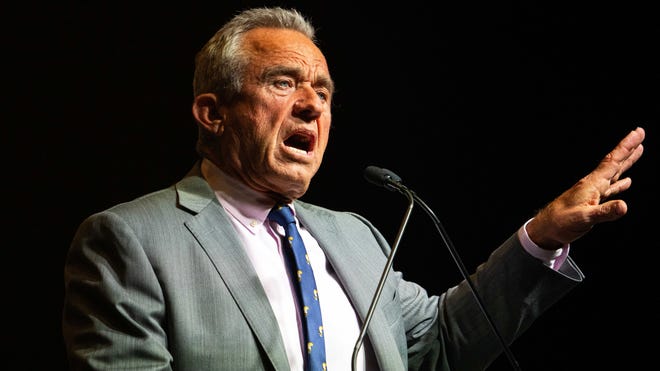In an unexpected turn of events surrounding the upcoming presidential election, Robert F. Kennedy Jr.’s appeal to be stricken off the Wisconsin ballot has been denied, inspite of his official withdrawal from the presidential race. The decision, a product of this Tuesday’s meeting by the Wisconsin Elections Commission, ensures that his name stays in the competition for the November election. The removal attempt came in the wake of Kennedy endorsing former President Trump and suspending his own campaign amid concerns of negatively impacting Trump’s potential for success in the 2024 race.
The Wisconsin Election Commission’s decision was clear-cut, with only one out of six votes cast supporting Kennedy’s plea. Robert Spindell, a member of the Commission, sided with Kennedy, but was unable to sway the outcome. This highlights the unique hurdles independent candidates like Kennedy face, dwarfing the challenges confronted by nominees from major political parties. Given the rigors of petitioning for ballot access in each state and the District of Columbia separately, independent nominees walk a tough path.
In another significant battleground state, Michigan, Kennedy Jr.’s name will also continue to grace the ballot. The state’s Secretary of State has declared that the stages for ballot alteration have passed, leaving third-party candidates in an irreversible situation.
Interestingly, Secretary of State Jocelyn Benson, who rejected Kennedy Jr.’s application to have his name withdrawn from the Michigan ballot, has faced a parallel predicament. Benson’s attempt to exclude far-left contender Cornel West from the ballot sparked a legal skirmish which she lost. Currently, she is focused on legal efforts to appeal the decision.
As a result of these decisions, voters in these key states are going to find Kennedy’s name on the ballot as an option despite his official suspension of the presidential race. Cheri Hardmon, senior press secretary for Michigan Secretary of State Jocelyn Benson, clarified this to Axios saying, “Minor party candidates cannot withdraw, so his name will remain on the ballot in the November election.”
Nonetheless, Kennedy did see a victory of sorts as he was successfully removed from the South Carolina ballot earlier on Tuesday. This decision by the state’s Election Commission marked a small triumph amidst his string of rebukes.
For Kennedy, his journey to the presidential race began with a subtle hint of the possible ambitions in early 2023. After getting the nod of approval from his wife, the seed was sown for a potential run for the highest office. By April, Kennedy had filed for the Democratic presidential nomination, launching his campaign officially later that month in Boston.
As the year progressed, Kennedy orchestrated a shift from a Democrat to an independent contender by October, underlining his unique and versatile political stance. While political dynasties are not unfamiliar occurrences in presidential races, Kennedy’s enlistment was noticeable, coming from a politically influential family.
Throughout his campaign, Kennedy’s presidential ambitions caught the attention of numerous Republican donors and allies of Trump. They found Kennedy a compelling figure, viewing his potential involvement in the race as a game changer that could disrupt the existing political landscape. His unique position held potential to reorient the electoral dynamics in the presidential race.
Despite the robust support, Kennedy’s campaign encountered significant hurdles including declining poll numbers and financial strains. In a quest for political relevance, Kennedy approached both the Harris and Trump campaigns with the proposition of a cabinet role. In an unexpected twist, Kennedy shifted his alliance towards Donald Trump after receiving no positive response from the Harris campaign.
In contrast to his previous criticisms of Donald Trump, Kennedy wholeheartedly endorsed him in a rally in Arizona this Friday. This has undoubtedly added an interesting chapter in the narrative of the upcoming November election, one revolving around shifting allegiances and the unpredictable nature of political campaigns.
Despite his noble efforts, Kennedy’s presidential ambitions seem to have been eclipsed by the rough and tumble world of politics. The denial to remove his name from key swing state ballots and the struggle to manage his campaign have revealed the myriad challenges of independent candidates. It highlights just how delicate the political balance can be and how quickly one’s fortune can change in the face of electoral politics.
In conclusion, the decision to maintain Kennedy’s name on the ballots in Wisconsin and Michigan, despite his official suspension of the presidential run, creates an interesting dynamic for the upcoming election. Despite his transformation from candidate to endorser, Kennedy’s name will remain in the mix. How this may potentially influence the swing state results remains to be seen.
For the voters in these influential states, seeing Kennedy’s name on the ballot, inspite of his official withdrawal, may well offer a glimmer of the unpredictable nature of politics. With the upcoming election promising more twists and turns, the bid for the presidency remains as always – a fascinating race for power.


